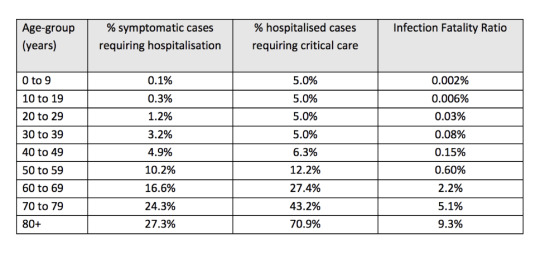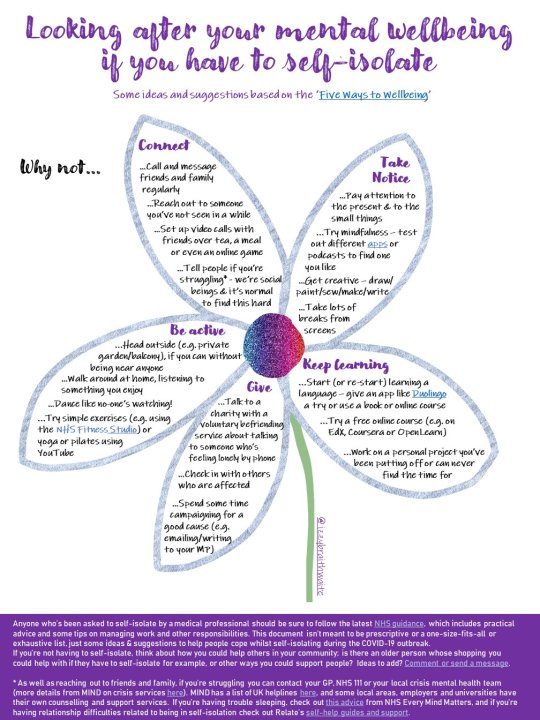#COVID19AT
Note
What are most common symptoms of corona?
Technically, spending 15 minutes within two meters of someone with the virus means a risk of catching it. The infection can develop anything from 1-14 days later.
The most common symptoms of COVID-19 are fever, tiredness, and a dry cough.
Some people may have aches and pains, a blocked nose, a runny nose, a sore throat, or diarrhea.
These symptoms are usually mild and begin gradually. Some people become infected but don’t develop any symptoms and don’t feel unwell.
Most people (about 80%) recover from the disease without needing special treatment.
Around one out of every six people with COVID-19 becomes seriously ill and develops difficulty breathing. Older people, and those with underlying medical problems like high blood pressure, heart problems or diabetes, are more likely to develop serious illness.
undefined
tumblr
Also includes the answer to questions from: @adriennegil, @2happy-little-trees, @11hoss, @bitchass-slytherin-snakery
Check out the full Answer Time here!
6K notes
·
View notes
Photo

http://srmarketing.online/foamatic-intl/
0 notes
Text
Mehr Ideen für Ihr Geld | 1g goldbarren kaufen

Es gibt sehr viele Ideen für Ihr Geld Investment aber nur eine kann Ihr Vermögen dauerhaft Schützen. Unter www.GOLDINVEST.at können Sie sich die besten Gold Produkte für Ihre Geld Anlage ansehen.
Mehr dazu: 1g goldbarren kaufen
#GoldInvest #Gold #Silber #Platin #Palladium #Osmium #Investment #COVID19at #Lehrer #Klopapier #IbizaUA
#GoldInvest#Gold Investment#chain of gold#Gold Investments#the goldfinch#goldskin#gold necklace#goldart#Osmium#Silberpreis#silber#Investiere in Silber#Silber online kaufen#silber differenzbesteuert#Palladium#1g goldbarren kaufen#1 2 unze gold wert#100 euro gold österreich#goldbarren wert 10g#philharmoniker goldmünze#1000g gold preis
1 note
·
View note
Link
https://www.mittellaendische.ch/2020/11/10/covid-19-4000-f%C3%BCr-deklaration-von-covid-toten/#gsc.tab=0 #COVID19 #Covidioten #Corona #CoronaInfoCH #CoronaDemo #COVID19at #COVIDIOTS
0 notes
Photo

#COVID-19AT#COVID-19#answertime#pandemic#COVID19AT mask for sell, contact me freely: [email protected]
0 notes
Note
Well good evening Miss I have a small doubt can we do sex normally or we can avoid our sex for covid can I you justify. Thanks
There’s a good article in the Guardian that summarizes sex and other forms of intimate physical contact. In summary:
It’s not sexually transmissible BUT can be spread through kissing, and possibly also ‘feco-orally,’ which means rimming might have to be off the cards for a while.
If someone is symptomatic, they should be self-isolating, which means sex is also off the cards.
For asymptomatic people who live together—sure, have sex.
For couples who live apart, unfortunately, the advice from this article says:
“The recommendation right now is that we try to stay home as much as we can and really only interact with people for things that are essential, like groceries. And even when we do that, try to keep some physical distance of about 6ft from other people. That would definitely make sex a challenge. Sexual intercourse may decrease during the next few weeks, but other forms of expressing eroticism, such as sexting, video-calls, reading erotica, and masturbation, will continue to be options.”
If you’re single, sadly, the advice seems to be to limit physical connections with other people.
Check out the full Answer Time here!
4K notes
·
View notes
Note
What should I do if I start to see symptoms?
Social Distancing
Social distancing is staying away from other people to avoid catching or spreading a virus—basically, avoiding crowds. That could mean working from home rather than catching a train to the office, avoiding concerts or weddings, or skipping that half marathon you’ve been training for. Even if you’re healthy, it’s a good idea for the health of others to try and avoid social situations. I think of it like a forest fire spreading: By cutting paths between the trees, you can control the fire. Social distancing is something we think of as a public health intervention.
Self-isolation
I’m basing this bit on UK advice. If you have:
a continuous, dry cough OR
Fever >37.8 degrees
You should self-isolate for seven days until you’re no longer infectious. If you live with others, they should self-isolate for 14 days, because that’s the length of time it can take to develop symptoms. They should then self-isolate for seven days from when they show symptoms.
Here’s a really difficult illustration to understand that highlights the situation in the UK:

Medication
Generally, for mild to moderate symptoms that can be treated at home, I’d suggest taking Paracetamol to help with muscle aches and fever symptoms, and ensuring you’re getting enough fluids, like herbal tea or water.
So far, the WHO has responded to concerns over the use of NSAID medication such as Ibuprofen by saying there isn’t sufficient evidence to recommend against their use—though there have been reported concerns, especially from doctors in France.
Requiring Hospital
If symptoms worsen and breathing becomes more difficult, then it’s advisable to seek medical advice. For those living in the UK, that’s through the NHS 111 website: https://111.nhs.uk/covid-19/.
If you are admitted to hospital due to difficulty in breathing, then you may be started on oxygen to help raise the oxygen levels in the blood. If breathing becomes more difficult, then a machine is able to breathe on a person’s behalf—this is called a ‘ventilator’ and is usually used in departments like Intensive Care, or when people are under anaesthetic during surgery.
Unfortunately, antibiotics do not work against viruses, they only work on bacterial infections. A virus causes COVID-19, so antibiotics do not work. Antibiotics should not be used as a means of prevention or treatment of COVID-19. They should only be used as directed by a physician to treat a bacterial infection.
undefined
tumblr
Check out the full Answer Time here!
4K notes
·
View notes
Text
Thanks for your questions. Stay safe Tumblr!
3K notes
·
View notes
Note
Friends, furry friends (pets), and family: who is at risk?
People who get the severe disease are more likely to fall within certain categories. From what we have seen so far, that’s people who have underlying conditions such as high blood pressure, diabetes, ischaemic heart disease, and chronic lung disease. They’re also more likely to be older:

Generally, it seems that young people, children, and teens don’t really seem to get the severe disease. We’re not too sure why that is. We also don’t know if young people are ‘asymptomatic shedders’—meaning that they’re passing the virus on despite not showing symptoms.
Being immunosuppressed means having a reduced immune function, for example, because of an underlying health condition or being on medication such as chemotherapy. This may increase the risk of severe disease based on what we know from other infections such as the flu.
Expectant mothers are at increased risk of many viral infections. It’s sensible to assume they may be at increased risk of COVID-19, too, and should, therefore, be managed as a high-risk group until evidence emerges to the contrary.
So, as it stands, anyone who has a possibly reduced immune function, that’s:
People over 70
People with underlying health conditions: usually those that mean you’re eligible for a flu vaccine
Pregnant women
are advised to be extra cautious and follow physical distancing measures more stringently.
Here’s a great article for looking after kids and babies, but we’ve not really seen kids getting severe infections.
A Word on Pets
While there has been one instance of an infected dog in Hong Kong, to date, there is no evidence that a dog, cat, or any pet can transmit COVID-19. COVID-19 mainly spreads through droplets produced when an infected person coughs, sneezes, or speaks. To protect yourself, clean your hands frequently and thoroughly.
Also includes the answer to questions from: @rebsadvodka, @mightbemadhatter, @disbean, @shogologo, @robbiecore & @paqe-jeshile, @leolaphine, @morbid-apricots, @angel-stains
Check out the full Answer Time here!
3K notes
·
View notes
Note
Hi Dr Rita How do you catch the virus??? If someone has it can they pass it on by touch??
From what we know so far, the coronavirus seems to spread like other respiratory illnesses. That’s through:
1. Someone coughing and you breathing in the particles into your lungs, or
2. Those particles being on a surface (for example someone coughing into their hand and then touching a door handle), and then you touching those particles and transferring them to your mouth.
An analysis in the NEJM found that the virus can remain in the air for up to 3 hours, on copper for up to 4 hours, on cardboard up to 24 hours, and on plastic and stainless steel up to 72 hours.
That’s why the following strategies are so important:
Wash your hands regularly for 20 seconds—the WHO recommends 6-9 times a day—and especially after going out, and before eating.
Try to limit touching your mouth or face.
If you cough, cough into your elbow (instead of your hand) or a tissue. Chuck tissues away.
Clean surfaces regularly.
If you have symptoms, follow self-isolation advice.
I’d also generally avoid touching and kissing others, especially on the face, and especially if you don’t live together. If you do live together, then—unless you’re all self-isolating in your rooms—it’s likely most household contacts will get infected.
If you think a surface may be infected, clean it with simple disinfectant to kill the virus and protect yourself and others. Clean your hands with an alcohol-based hand rub or wash them with soap and water. Avoid touching your eyes, mouth, or nose.
I would recommend regularly cleaning down surfaces that you touch—such as door handles. It’s generally advisable to wash fruit & veg before eating!
Also includes the answer to questions from: @ruthlesstormwitch, @thatonesquirrel & @lonefightersworld, @tatsunoko-pioneer, @hilarysemails, @hilarysemails
Check out the full Answer Time here!
3K notes
·
View notes
Note
Are there different strains of covid-19 that we are up against?
Coronaviruses are a large family of viruses which may cause illness in animals or humans. In humans, several coronaviruses are known to cause respiratory infections ranging from the common cold to more severe diseases such as Middle East Respiratory Syndrome (MERS) and Severe Acute Respiratory Syndrome (SARS). The most recently discovered coronavirus causes coronavirus disease COVID-19.
COVID-19 is a new illness that can affect your lungs and airways, caused by the most recently discovered coronavirus. This new virus and disease were unknown before the outbreak began in Wuhan, China, in December 2019.
Researchers at a Chinese university identified two separate strains of the COVID-19 coronavirus, finding that 70% of cases were the more aggressive type, while the less aggressive type comprised the other 30%. That more aggressive strain was found in early cases from Wuhan, China, where the coronavirus is thought to have originated from, and the researchers believe it may have evolved from the less aggressive type.
Check out the full Answer Time here!
3K notes
·
View notes
Note
How can I keep myself healthy and safe?
From a personal perspective, I’d already gone on a bit of a health kick a few weeks back, which has meant trying to eat healthily (lots of fruit and veggies), exercising regularly, and quitting smoking and drinking (yes I do recognise the hypocrisy of being a doctor who occasionally smoked!).
undefined
tumblr
I think one of the best things you can do during this time is to quit smoking or vaping because smokers are more at risk of respiratory infections. I wrote a little tweet-guide as to how I did it.
Vitamin C has been shown to help stave off the common cold. In general, I’d suggest you make sure you’re eating healthily. You can get natural sources of vitamin C, which include citrus fruits, kiwi, and broccoli.
Zinc has also been shown to be beneficial for colds. Natural sources of zinc include pumpkin seeds, dark chocolate, and chickpeas.
If you’re eating a sufficiently varied diet, then you won’t necessarily need to take oral multivitamin tablets. However, as we’ll all be indoors more, we may find that we benefit from a vitamin D supplement (which we usually get from the sun).
If you’re living in an area where you can still go outside, then walks can be good for your physical and mental health. Try to maintain a good distance from others, and wash your hands for 20 seconds—especially when you get back home. As we still don’t have all the information about how long COVID-19 remains in the air, if you’re particularly at risk, I would perhaps advise staying at home.
I know COVID-19 is really scary; make sure you’re taking the right precautions, but also be sure to try and spend some time every day doing things you enjoy and taking your mind off the virus. My friend has put together a guide to ensuring good mental health at this time:

Also includes the answer to questions from: @pretty-mattsun, @originalityisadirtyword, @missshadowsdarling, @brendanicus, @farawayleaf, @commie-cosmo
Check out the full Answer Time here!
2K notes
·
View notes
Note
What piece of misinformation do you hear the most often?
Most mornings, my mum has sent me something on WhatsApp which is usually wrong! The one I’ve seen the most is about drinking lots of water regularly, or gargling, to ‘dislodge’ the virus. Even though it’s good to stay hydrated, there’s no evidence in favour of gargling or drinking every 15 minutes!
Check out the full Answer Time here!
2K notes
·
View notes
Note
What can I do to help others during the COVID-19 crisis?
Now is a great time to pull together in our local communities—in our neighbourhoods and online spaces—to make sure that people are looked after and supported. That especially means our older neighbours, those with underlying health conditions, and those who may not be so tech-savvy, or are prone to loneliness. In the UK, we’ve seen lots of ‘mutual aid’ groups pop up based on where you live. Here’s a list of mutual aid groups in the UK.
undefined
tumblr
Credit: VideoRev
Also includes the answer to questions from: @morbid-apricots,@amorouscottage, @angel-stains
Check out the full Answer Time here!
2K notes
·
View notes
Note
are there any projections as to how the COVID19 situation will develop?
To date, there is no vaccine and no specific antiviral medicine to prevent or treat COVID-19. Possible vaccines and some specific drug treatments are under investigation and are being tested through clinical trials. The WHO is coordinating efforts to develop vaccines and medicines to prevent and treat COVID-19. Realistically, it could take many months for a vaccine to be developed and scaled up for worldwide distribution—but we’re moving on this with speeds I’ve not seen before. I think it's really important that we all call for a vaccine available to all people, not just those who are able to pay.
It’s too early to tell how long the virus will last, how many will get infected, and whether there will be annual outbreaks. Projections show that, without any intervention, up to 80% of the UK & US populations could be infected. We may well need a vaccine to prevent a repeat ‘spike’ in cases when social distancing measures are relaxed.
Also includes the answer to questions from: @propofolle, @angrylilgirlie, @shakespeareisbetterthanchocolate, @tarayummyy, @daydreamers-inn
Check out the full Answer Time here!
1K notes
·
View notes